Hello guys, i have an old game project written in cocos2d-html the game is compile for android using android studio (cocos2d-x 3.17) , is ay easy way to import / upgrade this project into cocos creator?
cheers
3 posts - 2 participants
Hello guys, i have an old game project written in cocos2d-html the game is compile for android using android studio (cocos2d-x 3.17) , is ay easy way to import / upgrade this project into cocos creator?
cheers
3 posts - 2 participants
When moving your game to another platform, it’s always going to be a bit of a challenge. So for those doing it for the first time, we have a few tips and tricks by some of our team at Cocos to help you out!
What To Expect When Moving Your Game To A New Platform?
1 post - 1 participant
Hi, i did crop image like this and with is coed.
Original Image:

Crop Image:

crop image with green background.
Code:
clipper content size width and height
var width = 200, height = 200, winSize = cc.winSize;
var stencil = new cc.DrawNode();
stencil.drawCircle(cc.p(width/2, height/2), 40, 0, 200, 0, 100, cc.color(255, 255, 255, 255));
var clipper = new cc.ClippingNode(stencil);
clipper.setContentSize(width, height);
clipper.setAnchorPoint(0.5, 0.5);
clipper.setPosition(winSize.width/2, winSize.height/2);
this.addChild(clipper);
var avatar = cc.Sprite.create(res.image);
avatar.setPosition( clipper.width / 2, clipper.height / 2);
avatar.setAnchorPoint(0.5, 0.5);
clipper.addChild(avatar);
Here I have a two problems:
when I am tray to create 6 crop images I got this Waring?
Failed to allocate buffer for DrawNode: buffer for 64 vertices requested
is there any best or simple way to crop images?
1 post - 1 participant
If you’ve been playing a game with a bridge, a rope, a snake, or another line with a texture, you may be wondering how you can do the same for your game. Our star writer, Baiyu Wubing, from the Chinese forums, shared this great tutorial on how to do the same for your game.
First, here is his example.
Let’s start by creating a scene cc.Graphics node and add a child node cc.Sprite, and change the rendering mode to Mesh.
Because Mesh coordinates are calculated from the top left corner, and the Graphics drawing is drawn from the center.
So cc.Spritenode, Scaleadjust (1,-1), Anchor adjust (0,1).
In order to make sure the texture is filled after repeating beyond the boundary, the obtained texture size has to be a perfect square and set Repeat.
The drawing texture definitely needs some coordinate position information.
Take a look at the Graphics of WebGL realization.
Graphics has an a _impl variable.
That _impl also has a _paths variable, the points of all objects recorded paths, and a corresponding image line.
While lineTo and moveTo will go to _paths stuffing data points to draw the line.
For the circle and arc and rect, other interfaces eventually calls lineTo and moveTo.
So with this _paths we draw the texture, you can traverse the first point out.
for( let index = 0; index < _impl._paths.length; index++) {
const path = _impl._paths[index];
const pathPoints = path.points;
if (pathPoints.length < 2) continue;
for(let index2 = 1; index2 < pathPoints.length; index2++) {
// current point
const p = cc.v2(pathPoints[index2].x, pathPoints[index2].y);
// previous point
const p_pre = cc.v2(pathPoints[index2 - 1].x, pathPoints[index2 - 1].y);
}
}
Now, how to paint with texture?
First, consider two adjacent points, then according to the line width of w for rectangle painting. The rectangle has four points, and we ask for the coordinates of these four points.
Now calculate the direction of these two points.
const dir = p.sub(p_pre); // direction
Then find a vector in the vertical direction (calculated based on the inner vector product being 0) of the length is half the line width.
const cross_dir = (dir.y == 0 ? cc.v2(0, 1) : cc.v2(1, -dir.x / dir.y).normalize()).mulSelf(w / 2); // Vertical direction
The four vertices of this rectangle can be obtained from the two points and the vertical direction.
const p_r_t = p.add(cross_dir); // upper right
const p_r_b = p.sub(cross_dir); // upper left
const p_l_t = p_pre.add(cross_dir); // bottom right
const p_l_b = p_pre.sub(cross_dir); // bottom left
The last four points padding sprite.spriteFrame data vertices, if it is not understood, reference this article Preliminary grid sprite rendering mode! (Chinese only)
For uv texture coordinates, vertex coordinates used here directly a scaling factor. The reference code is as follows.
const uv_mul = 50;
const i_offset = vertices.x.length;
vertices.x.push(p_r_t.x, p_r_b.x, p_l_t.x, p_l_b.x);
vertices.y.push(p_r_t.y, p_r_b.y, p_l_t.y, p_l_b.y);
vertices.nu.push(p_r_t.x / uv_mul, p_r_b.x / uv_mul, p_l_t.x / uv_mul, p_l_b.x / uv_mul);
vertices.nv.push(p_r_t.y / uv_mul, p_r_b.y / uv_mul, p_l_t.y / uv_mul, p_l_b.y / uv_mul);
vertices.triangles.push(i_offset + 0);
vertices.triangles.push(i_offset + 1);
vertices.triangles.push(i_offset + 2);
vertices.triangles.push(i_offset + 1);
vertices.triangles.push(i_offset + 2);
vertices.triangles.push(i_offset + 3);
There is a problem with drawing rectangles in this way. For drawing arcs, if the separation is too large, or the line width is relatively large, separation will occur.
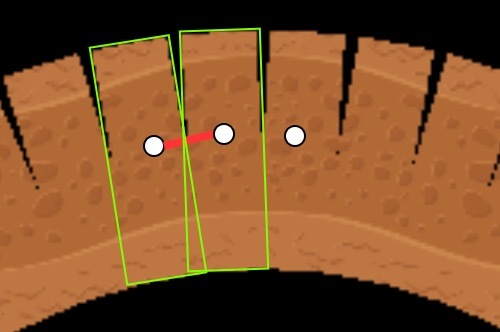
So how to deal with this gap?
Just draw a circle at the connection point so that the gap can be removed.
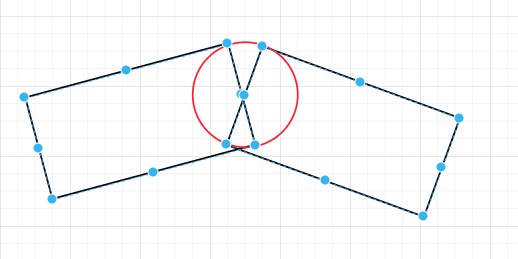
So how to draw a circle? A circle can be regarded as a regular polygon, and the position coordinates can be confirmed according to the relationship between the radius and the center of the circle. Please refer to the special loading effects of shader animation! article to learn more. (Chinese only)
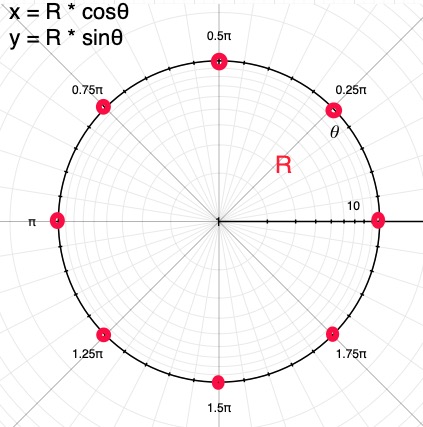
The radius is exactly half the width of the line. The coordinates on a circle are converted into the following code.
//angle
const r = 2 * Math.PI * index3 / count;
// Calculate the direction vector first, and add the coordinates of the center of the circle to the point on the circle.
const pos_circle = cc.v2(w / 2 * Math.cos(r), w / 2 * Math.sin(r)).addSelf(p);
How to determine the vertex index?
In fact, you can follow the center of the circle and draw triangles one by one.
Of course, this is one of the indexing methods, converted into the code as follows.
// Drawing a circle
const count = 12;
i_offset = vertices.x.length;
vertices.x.push(p.x);
vertices.y.push(p.y);
vertices.nu.push(p.x / uv_mul);
vertices.nv.push(p.y / uv_mul);
for (let index3 = 0; index3 < count; index3++) {
const r = 2 * Math.PI * index3 / count;
const pos_circle = cc.v2(w / 2 * Math.cos(r), w / 2 * Math.sin(r)).addSelf(p);
vertices.x.push(pos_circle.x);
vertices.y.push(pos_circle.y);
vertices.nu.push(pos_circle.x / uv_mul);
vertices.nv.push(pos_circle.y / uv_mul);
if (index3 === 0) {
// 0 - count -1
vertices.triangles.push(i_offset, i_offset + 1 + index3, i_offset + count);
} else {
// 0 - index3 - (index3-1)*
vertices.triangles.push(i_offset, i_offset + 1 + index3, i_offset + index3);
}
}
The above is just to achieve the effect of simple drawing texture. If you want to achieve the effect of rope, you need to recalculate the texture coordinates, which are related to the position/direction/length.
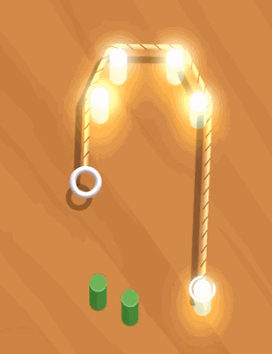
Realization principle
Several front lines drawing texture has been achieved; the main goal is to calculate the correct uv coordinates.
Because this line has a direction and a length, it will affect the calculation of texture coordinates.
One idea here thinks that pulling all the line segments into a straight line and place them in one direction.
In order to make this texture move from the head from the tail, after straightening, the last point is used as the starting point of the texture.
So when traversing this point, start from the end and record the length of each section.
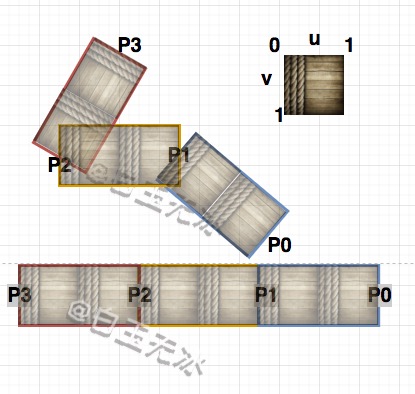
Texture coordinates v two points are 0and 1. The texture coordinates u(horizontal direction) are calculated based on the length of the rope.
// Calculate from the last point
for (let index2 = pathPoints.length - 1; index2 > 0; index2--) {
// Omit part of the code
vertices.x.push( **p_r_t** .x, p_r_b.x, **p_l_t** .x, p_l_b.x);
vertices.y.push( **p_r_t** .y, p_r_b.y, **p_l_t** .y, p_l_b.y);
// Calculate uv
vertices.nu.push(offsetX.x * uv_mul, offsetX.x * uv_mul, (offsetX.x + dirLen) * uv_mul, (offsetX.x + dirLen) * uv_mul);
vertices.nv.push(1, 0, 1, 0);
// Omit part of the code
offsetX.addSelf(cc.v2(dirLen, 0)); *//* *Record the length of the drawing*
}
One problem with this backward traversal is that the head will cover the texture of the tail.
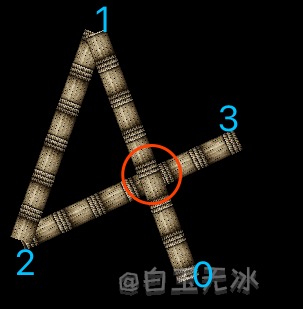
So after calculating the vertex index of the rectangle, it needs to be reversed as a whole and let him draw from the beginning. The main code is as follows.
let trianglesCache: number[ ][ ] = [ ];
for ( let index2 = pathPoints.length - 1; index2 > 0; index2--) {
// Omit part of the code
triangles.push(i_offset + 0);
triangles.push(i_offset + 1);
triangles.push(i_offset + 2);
triangles.push(i_offset + 1);
triangles.push(i_offset + 2);
triangles.push(i_offset + 3);
trianglesCache.push(triangles);
}
trianglesCache.reverse(); //Vertex index inversion
trianglesCache.forEach(v => {
//True vertex index order
vertices.triangles.push(...v)
}
After inversion, the texture of the rope is correct.
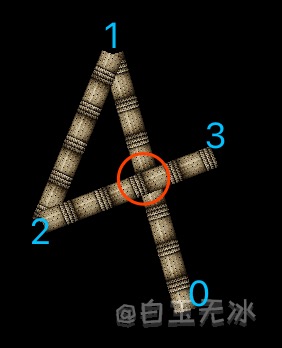
For drawing a circle at the connection (actually a polygon), you need to pay attention to the rotation of each point so that the texture direction of the circle is correct.
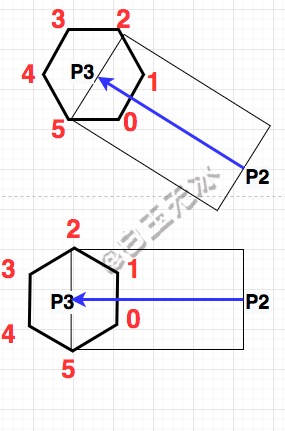
The reference code is as follows.
// Draw a circle
const dir_angle = dir.signAngle(cc.v2(-1, 0)); //The included angle with the negative direction of the x-axis
const count = 12;
i_offset = vertices.x.length;
// Here is the center of the circle
vertices.x.push(p.x);
vertices.y.push(p.y);
vertices.nu.push(offsetX.x * uv_mul);
vertices.nv.push(0.5);
for (let index3 = 0; index3 < count; index3++) {
const** r = 2 * Math.PI * index3 / count;
//Vector from center to each side
const pos_circle = cc.v2(w / 2 * Math.cos(r), w / 2 * Math.sin(r));
vertices.x.push(pos_circle.add(p).x);
vertices.y.push(pos_circle.add(p).y);
// Need to rotate for round uv
vertices.nu.push((pos_circle.rotate(dir_angle).x + offsetX.x) * uv_mul);
vertices.nv.push(pos_circle.rotate(dir_angle).y / w + 0.5);
if (index3 === 0) {
triangles.push(i_offset, i_offset + 1 + index3, i_offset + count);
} else {
triangles.push(i_offset, i_offset + 1 + index3, i_offset + index3);
}
}
Finally, let me draw a star for everyone~
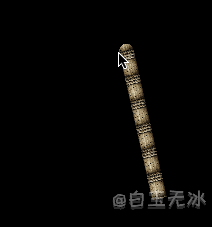
Summary
The whole idea of the rope texture is to convert all the curved lines into straight, and then calculate the texture coordinates.
The above is using Cocos Creator v2.3.3. I hope this helps you a little and welcome to share with friends around you.
Check out this and my other tutorials in my GitHub.
1 post - 1 participant
If it is possible, would be great an checkbox in the folders (like there is the “is bundle”), to skip this folder in autosync when the creator is highlighted again.
I have projects that the creator freezes like 30s or more, and most of the assets are inside a specific folder, so skip it and only sync when asked for and/or on the engine load would be great.
1 post - 1 participant
Hey all,
I have a ready application. I can use it by running from android studio but while generating apk for it, I got a build error
Build command failed.
Error while executing process C:\Users\itsme\AppData\Local\Android\Sdk\cmake\3.10.2.4988404\bin\ninja.exe with arguments {-C C:\Development\android cocos games\Jump\cocos2d\cocos\platform\android\libcocos2dx\.cxx\cmake\debug\x86_64 MyGame}
ninja: Entering directory `C:\Development\android cocos games\Jump\cocos2d\cocos\platform\android\libcocos2dx\.cxx\cmake\debug\x86_64'
ninja: error: '../../../../../../../../external/Box2D/prebuilt/android/x86_64/libbox2d.a', needed by '../../../../build/intermediates/cmake/debug/obj/x86_64/libMyGame.so', missing and no known rule to make it
here is my build.gradle
apply plugin: 'com.android.application'
android {
compileSdkVersion PROP_COMPILE_SDK_VERSION.toInteger()
defaultConfig {
applicationId "org.cocos2dx.Jump"
minSdkVersion PROP_MIN_SDK_VERSION
targetSdkVersion PROP_TARGET_SDK_VERSION
versionCode 1
versionName "1.0"
externalNativeBuild {
cmake {
targets 'MyGame'
arguments "-DCMAKE_FIND_ROOT_PATH=", "-DANDROID_STL=c++_static", "-DANDROID_TOOLCHAIN=clang", "-DANDROID_ARM_NEON=TRUE"
cppFlags "-frtti -fexceptions -fsigned-char"
}
}
ndk.abiFilters 'armeabi-v7a','arm64-v8a','x86','x86_64'
}
sourceSets.main {
java.srcDir "src"
res.srcDir "res"
manifest.srcFile "AndroidManifest.xml"
assets.srcDir "../../Resources"
}
externalNativeBuild {
cmake {
path "../../CMakeLists.txt"
}
}
signingConfigs {
release {
if (project.hasProperty("RELEASE_STORE_FILE")) {
storeFile file(RELEASE_STORE_FILE)
storePassword RELEASE_STORE_PASSWORD
keyAlias RELEASE_KEY_ALIAS
keyPassword RELEASE_KEY_PASSWORD
}
}
}
buildTypes {
release {
debuggable false
jniDebuggable false
renderscriptDebuggable false
minifyEnabled true
shrinkResources true
proguardFiles getDefaultProguardFile('proguard-android.txt'), 'proguard-rules.pro'
if (project.hasProperty("RELEASE_STORE_FILE")) {
signingConfig signingConfigs.release
}
}
debug {
debuggable true
jniDebuggable true
renderscriptDebuggable true
}
}
ndkVersion '21.0.6113669'
}
android.applicationVariants.all { variant ->
def project_root_folder = "${projectDir}/../.."
def dest_assets_folder = "${projectDir}/assets"
// delete previous files first
delete dest_assets_folder
def targetName = variant.name.capitalize()
def copyTaskName = "copy${targetName}ResourcesToAssets"
tasks.register(copyTaskName) {
copy {
from "${buildDir}/../../../Resources"
into "${buildDir}/intermediates/assets/${variant.dirName}"
exclude "**/*.gz"
}
}
tasks.getByName("pre${targetName}Build").dependsOn copyTaskName
}
dependencies {
implementation fileTree(dir: 'libs', include: ['*.jar'])
implementation project(':libcocos2dx')
}
Can someone please help me
Thanks in advance.
5 posts - 2 participants
Please provide instructions on how to build for Apple tvOS - your documentation appears non-existent here and there is little to no useful information I could find online.
2 posts - 2 participants
I have 3 classes (A, B, C)
A.ts
import B from "./B";
const {ccclass, property} = cc._decorator;
@ccclass
export default class A extends cc.Component {
@property(B)
refB: B = null;
}
B.ts
import C from "./C";
const {ccclass, property} = cc._decorator;
@ccclass
export default class B extends cc.Component {
@property(C)
refC: C = null;
}
C.ts
import A from "./A";
const {ccclass, property} = cc._decorator;
@ccclass
export default class C extends cc.Component {
@property(A)
refA: A = null;
}
due to circular dependency / referencing, either refA / refB/ refC will be null in IDE. how to fix this problem in typescript?
2 posts - 2 participants
Hi,
I have a player that is holding and rolling a barrel in front of him.
I want to be able to throw the barrel vertically. I use the applyImpulse function.
The problem is, as the barrel is rotating so is it’s coordinate system. So I cannot know which direction to throw the barrel in. Instead of using the local coordinates I would like to throw the barrel along the world’s y-axis. Is there a way to do that?
1 post - 1 participant
I’m having a strange problem, the physics in my game is running faster in a browser than it is in the simulator. In my game, I can aim in 360 degrees and fire off a shot. The shot (a rigidbody attached to a sprite, not a bullet) is always given the same speed, and is fired off in the direction the player aimed. The shot is moved by setting its linear velocity. I have an array of unit vectors for each degree in all 360 degrees, and I multiply the unit vector by my speed (set to 500 always) to calculate velocity.
In the simulator, everything looks as I expect. In the browser, the shot moves way faster than I expect. I placed some log statements and found out how far the shot fires the first frame after velocity is applied:
Shot position after frame 1 (Simulator): (-2.58, 7.93, 0.00) dt: 0.016667999999999666
Shot position after frame 1 (Browser): (-2.22, 8.03, 0.00) dt: 0.006881000000000313
This is a 2D game so I’ll ignore z values. In the simulator the shot moves from (0, 0) to (-2.58, 7.93) in 0.01667 seconds (60fps). This is what I expect, the distance traveled is 7.717 , the frames per second is 60.
Looking at the browser, the shot moves from (0, 0) to (-2.22, 8.03). A similar distance traveled of 7.499, however it did so in 0.006881 seconds. It traveled almost the same exact distance in one frame at 145fps in the browser as it did in 60fps in the simulator.
I’ve tried to cap the frame rate to 60fps in the browser by calling:
cc.game.setFrameRate(60);
But that doesn’t seem to have an effect on anything.
Am I doing something wrong? This behavior makes no sense to me, I feel like the fix is something completely obvious that I’m missing here. Any help would be appreciated, thanks!
1 post - 1 participant
Hi…
I really present my apologies about the topic, but i’m wondering what is the future of Cocos2d-x, first, i need to say this engine is really confortable, and of course seems to be in a very mature state, so sometimes i wonder myself : Myself… maybe there is no more update because the engine works flawlessly and does not require more maintenance… And that has some sense since a 2D game really does not has much things to take in mind than some sprites, sounds and inputs (not at least as a 3d game that cover a lot of more topics like shaders and so)…
Could we say Cocos2d-x does not needs more maintenance?..
Greetings.
4 posts - 2 participants
Cocos2d-x
Is there any way to rotate a Sprite3D object by World Axis?
3 posts - 1 participant
Hi,
I have got quite far in building a web-mobile game with a windows docker container, but the build gets stuck at this stage:
When I run this without a docker container I can pass this stage and when I’m looking at the CLI output I think it gets stuck on build jsb-adapter.
Locally CLI output logs from same place in the build where it passes to the next stages instead of timing out:

@jare I’m tagging you because I think you have some nice input here in trying to get me further into the build, cause I’m pretty stuck at this stage.
I’m building on currently latest windows 10 docker container:
mcr.microsoft.com/windows:2004
Any ideas?
1 post - 1 participant
Hello,
I’m trying to change a sprites hue value using a js code
Here is what I want:

I looked up in the documentation but couldn’t find something that works perfectly as I wanted.
A link or an answer would be really nice 
2 posts - 2 participants
Is there any way to see the output of console.log when running the game on Facebook Instant Games - Android platform?
I am looking at adb logcat but the cocos logs don’t show up there. Any ideas?
2 posts - 2 participants
A new showcase of Cocos games has appeared for you to check out! If you want to be a part of the next showcase, message us, and share your game. Your game must be 100% complete or being released in the same month in which we release a new showcase video.
Watch it on YouTube
1 post - 1 participant
I want to get a label with a clear outline.
Mobile devices also display labels with blurred edges, like on windwos.
I tried several methods, but either they weren’t valid anymore or there were only ways to turn off texture anti-aliasing.
As in this post, calling setAliasTexParameters() of Label’s FontAtlas also gives blurry results.
This method also doesn’t work.
If the edges of the label are not clear, the game will look messy overall. Is there any solution?
Thank you for reading!! 
1 post - 1 participant
Hi,
I have a problem due to my Physics Body spawning at (0, 0) when I create an enemy.
My game is a sidescroller where the enemies walk from right to left and on the left side of the screen I use a raycast to check whether an enemy has reached its destination. So now I have the problem that the enemies reach their destination immediately when they spawn instead of when they reach the left side of the screen by walking there.
My inheritance hierarchy is as follows:
Scene -> AutoScrollerClass -> ScreenToBeScrolled (inherits Node) -> EnemyClass (inherits Node) -> Sprite (which has the PhysicsBody component)
I set the position and scale of the EnemyClass, but when I create the PhysicsBody and add it to the sprite (which is at this point not child of the enemy class yet) it spawns in the bottom left corner of the screen ((0,0) of the Scene I imagine) and only then gets moved to its proper location. How can I avoid this?
PS: I tried setting the position and scale of the sprite instead, but it didn’t help.
2 posts - 2 participants
I am using cocos v3.9, and I have been looking for a problem and a solution, someone suggested that I upgrade the version of the sqlcipher, but I am confused about doing it, can anyone help me to solve this problem?
Thank you in advance
2 posts - 2 participants
Hello there,
I’m using 3.17.2 version of Cocos2dx engine.
When app is in background and download is started I’m getting this bug report in Firebase.
Fatal Exception: java.lang.UnsatisfiedLinkError
No implementation found for void org.cocos2dx.lib.Cocos2dxDownloader.nativeOnProgress(int, int, long, long, long) (tried Java_org_cocos2dx_lib_Cocos2dxDownloader_nativeOnProgress and Java_org_cocos2dx_lib_Cocos2dxDownloader_nativeOnProgress__IIJJJ)
Any help is appreciated.
Thanks!
1 post - 1 participant